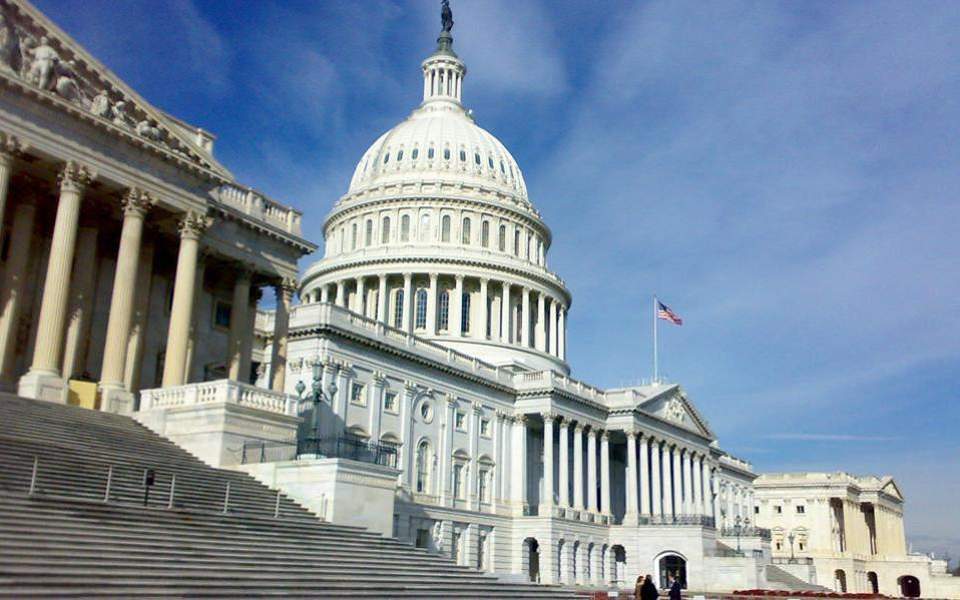By Endy Zemenides
The national security apparatus of the United States is a huge machine that incorporates a myriad of officials – from the Commander in Chief and members of his cabinet, to ambassadors and desk officers, to military and intelligence personnel.
Yet there is one group of national security officials that remains perpetually underappreciated in Greece. Consider the careers of the following national security officials who have served since the remarkable improvement in the US-Greece bilateral relationship began: President Obama; Vice Presidents Biden and Pence; Secretaries of State Clinton, Kerry and Pompeo; Secretaries of Defense Panetta and Hagel; Director of National Intelligence Coats; and CIA Directors Panetta and Pompeo. Besides serving in the Executive Branch, what else do they all have in common? Service in the United States Congress.
The fundamental differences between a parliamentary system like Greece’s and American constitutional democracy should theoretically give a pass to Greek officials, thought and business leaders for their lack of appreciation of the US Congress. Yet between having Greek American leaders go blue in the face trying to explain the importance of members of Congress and the track records of members of Congress in advancing to national security positions in the Executive branch, Greece’s leadership should have gotten the message by now. If none of the above is convincing enough, maybe the United States Constitution could provide a hint as well. The powers of Congress are laid out in Article I.
When it comes to the size and professionalism of staffs, the access to classified and secret information, decision making authority, or the ability to either force or prevent executive action, the US Congress stands alone among the world’s parliaments. Indeed, the top members of Committees like Foreign Relations, Armed Services or Intelligence can be as influential as the Foreign Minister or Defense Minister of many countries.
There is a new urgency for Greece to better understand the US Congress and to build better ties with its members. Last week, the Trump Administration unveiled its 2020 budget. The budget document traditionally reveals an administration’s priorities and the budget process reveals fundamental policy differences between an administration and Congress.
This year’s budget process – and the related emergency declaration that the Trump Administration has invoked in order to build a wall on the border with Mexico – will affect the trajectory along which the US-Greece bilateral relationship will advance. There is no question that Greece needs Congress more than ever.
I have previously argued in these pages that it is premature to compare the present bilateral relationship to the Truman era, because there is no Truman Doctrine or Marshall Plan associated with it. The 2020 budget and the emergency declaration prove that if it is up to the Trump White House, this era might never reach that high historical standard.
Take the State Department. President Trump’s budget imposed a 23% cut there. There is also a decrease in International Military Educational Training (IMET) funding for Greece from the $1 million appropriated by Congress last year to $550,000. And among other initiatives that will be cut to fund President Trump’s wall are the enhancements to Souda Bay.
Of course, these budget cuts are not aimed at Greece alone. All American allies have to come to terms with the policy priorities that the Trump budgets reflect. The Souda Bay cuts are part of broader cuts to the European Deterrence Initiative. Across the board, the Trump Administration has shown the propensity to make tremendous cuts to the very tools the US has traditionally used to keep allies on our side.
What lessons should Greece learn from the American budget process? Athens must come to terms with the fact that positive moves from the State Department or the US Embassy may be the beginning of a process rather than the end of one. Secretary Pompeo promised to restore the swagger of the State Department, but even he – clearly one of the President’s favorite cabinet members – could protect it from the budget saw. And as planning for a post-Pyatt Embassy starts taking place, it should be noted that the US doesn’t have ambassadors in Egypt, Turkey, Iraq, the United Arab Emirates, Jordan or Saudi Arabia. If the very people who are charged with advancing the bilateral relationship are not enabled (or perhaps not even present), it is difficult to see the promise of a “best ever” relationship being realized.
Now is the exact time for Greece to build a “best ever” relationship with the US Congress. As discouraging as the 2020 budget is, it doesn’t represent something new. And the Trump Administration has not been successful at getting its proposals past a Congress in which foreign spending enjoys wide bipartisan support. The administration submitted even deeper drops in foreign spending during each of the previous two years, and Congress largely restored them. This history gives credence to the observation of former Commerce Department official and political scientist David Rothkopf, who declared this budget “a document of fiction with the likelihood of being adopted into law roughly akin to the latest comic book that you’ve read.”
Several members of Congress that already realize the value of Greece as an ally are in key positions in the Foreign Relations, Appropriations and Armed Services committees in both chambers. Greece needs to get to know them all and appreciate what they already do and have the authority to do. Congress will be shaping the priorities of American foreign policy in the near term. It is time to engage it more closely on the US-Greece bilateral relationship. Congress has increased IMET spending, restored cuts to projects, and prioritized specific nominations before. It is time to encourage it to do so again at this critical juncture for both the US and Greece.
Endy Zemenides is executive director of the Hellenic American Leadership Council.
ekathimerini.gr



















